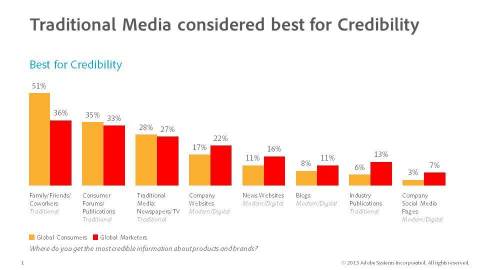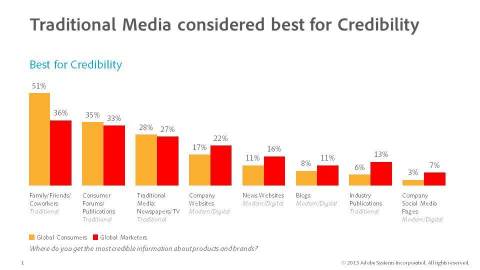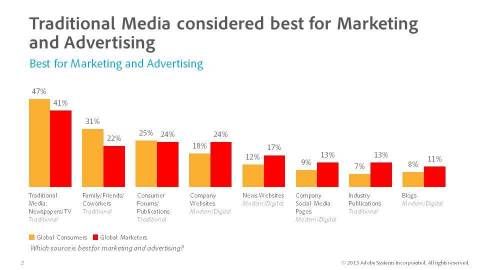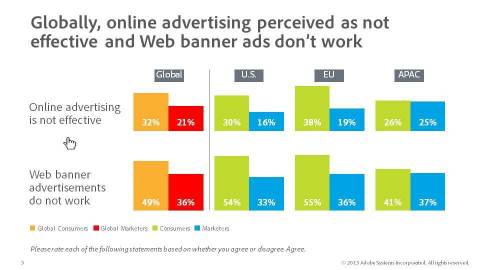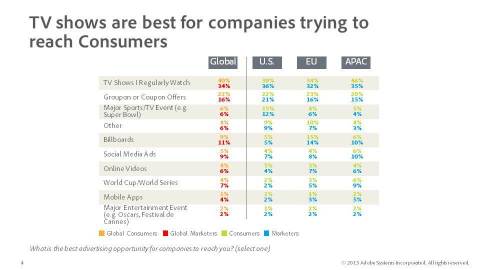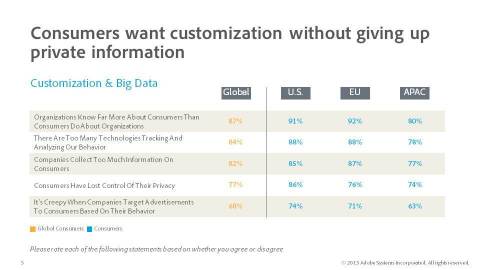SAN JOSE, Calif.--(BUSINESS WIRE)--Marketers are missing a powerful opportunity to engage with consumers and deliver personalized experiences that drive brand affinity, according to research released today from Adobe Systems Incorporated (Nasdaq:ADBE). The global study, Click Here: The State of Online Advertising, polled both consumers and marketers in seven countries across the United States, Asia-Pacific and Europe and exposes new global insights into the effectiveness of online marketing. The research has been released in advance of the Cannes Lions International Festival of Creativity, the largest gathering of advertising and marketing professionals held in Cannes, France, June 16-22.
Digital Marketing Not Meeting the Needs of Consumers
The study revealed that a significant portion of consumers and marketers feel online advertising is still not effective (consumers 32%; marketers 21%). Marketers in the U.S. and Europe were the most dismissive of online advertising. Consumer and marketing respondents globally believe that banner ads do not work (49% consumers; 36% marketers).
“Banners have brought much of the worst characteristics of advertising – being intrusive and manipulative, catching one's eye with hyperbole, and using surreptitiously-captured information – into the digital space. Consumers realize they are now in control and won't accept it. Yet, beyond banners, there is a lot of online marketing content that consumers do interact with, and the era of creativity to explore what works is just beginning,” said David C. Edelman, global co-leader, Digital Marketing and Sales Practice, McKinsey & Company.
Edelman continued, “The best marketers will focus on building their muscles in data to drive relevance, design to generate an experience that makes consumers feel good, and delivery to bring it on-demand. And as a side benefit, as consumers appreciate those experiences more, they will also value the marketing profession more highly, helping it attract the talent that will drive the right virtuous cycle.”
Traditional media such as print and TV received higher scores for credibility and effectiveness among consumers and marketers in all regions (traditional media 94% consumers; 91% marketers; modern/digital sources 52% consumers; 68% marketers). Respondents in Asia-Pacific were most likely to enjoy TV and print ads (42%), followed by European consumers (36%) and U.S. consumers (31%). Interestingly, text message ads in Asia-Pacific (34% consumers; 24% marketers) are not considered annoying compared to the U.S. (62% consumers; 59% marketers) and Europe (62% consumers; 57% marketers).
“Digital marketing has created a remarkable opportunity, but it comes with higher expectations from consumers. They expect a story tailored specially for them, a level of trust and transparency with the brands they do business with and, most importantly, a great experience. Brands delivering anything less will ultimately be ignored,” said Ann Lewnes, chief marketing officer, Adobe. “These survey results demonstrate that we aren’t quite delivering on digital marketing’s full potential yet. We now have the technology and know-how to target relevant and personalized marketing messaging and media to our customers. Shame on us, if we don’t deliver on that.”
Customization and Privacy
Across all regions, one-third of respondents agreed it is valuable when a website makes personalized product and service recommendations. Respondents in Asia-Pacific were less concerned than those in the U.S. and Europe about sharing private information in exchange for more personalized and customized experiences online. More specifically, respondents said they were comfortable with targeted advertising based on their behaviors (U.S.74%; Asia-Pacific 63%; Europe 71%). However, some actions, like being asked to share personal information such as a government-issued ID number (e.g., a social security number) were viewed as crossing the privacy line (U.S.86%; Asia-Pacific 55%; Europe 60%).
Opinion of Marketing and Marketers
According to respondents, the marketing profession was consistently ranked as one of the least valuable to society, although the profession is viewed most positively by consumers (24%) and marketers (47%) in Asia-Pacific. While marketers across the regions (U.S. 45%; Asia-Pacific 25%; Europe 28%) agree that marketing primarily helps inform consumers on brands, products and services, in Asia-Pacific, a significant percentage of marketers think it both educates (15%) and reflects and shapes cultures (14%). Further, U.S. consumers “like” brands they regularly buy (53%) or that have promotions (46%), while consumers in Asia-Pacific (33%) and Europe (26%) are more driven to “like” by aspirations and brand personality (40%).
Discussion at Cannes Lions Festival: “Can You Trust Marketers?”
At the Cannes Lions International Festival of Creativity next week, Lewnes will moderate a panel that touches on these research findings and explores how innovations in digital marketing have renewed the credibility of marketers, positioning the advertising world to drive business like never before. Lewnes will be joined by Lisa Donohoe, CEO of Starcom USA; Steven F Althaus, director of BMW Group; and Tina Brown, editor in chief of The Newsweek Daily Beast Company at 10 a.m. on Monday, June 17 in Grand Audi.
Learn more about Adobe's presence at Cannes Lions 2013, and see videos from the event: http://success.adobe.com/en/na/programs/cannes2013.html. Follow @Adobe for the latest updates and use #CannesLions to join the conversation.
About Click Here: The State of Online Advertising Study
The data points referenced above come from a study commissioned by Adobe, produced by research firm Edelman Berland and conducted as an online survey among a nationally representative sample of the population of each country. The study is based on interviews with 8,750 consumers and 1,750 professional marketers across the United States, Europe (United Kingdom, Germany, France) and Asia-Pacific (Japan, Australia, and South Korea). The research expands on the study Adobe initially executed in the United States in October 2012, which surveyed 1,000 consumers and 250 professional marketers to now include seven additional countries. The margin of sampling error at the 95% confidence level is as follows:
- U.S. (n=1,250): MOE = +/- 2.8% (October/November 2012)
- U.K. (n=1,250): MOE = +/- 2.8% (October/November 2012)
- Germany (n=1,250): MOE = +/- 2.8% (April 2013)
- France (n=1,250): MOE = +/- 2.8% (April 2013)
- Japan (n=1,250): MOE = +/- 2.8% (October/November 2012)
- Australia (n=1,250): MOE = +/- 2.8% (October/November 2012)
- South Korea (n=1,250): MOE = +/- 2.8% (April 2013)
For more information on the research results visit Click Here: The State of Online Advertising Study – Regional Comparisons and the animated infographic Click Here: The State of Online Advertising Infographic. For more detailed country-level comparisons, reference Click Here: The State of Online Advertising Study – Country Comparisons.
About Adobe Systems Incorporated
Adobe is changing the world through digital experiences. For more information, visit www.adobe.com.
© 2013 Adobe Systems Incorporated. All rights reserved. Adobe and the Adobe logo are either registered trademarks or trademarks of Adobe Systems Incorporated in the United States and/or other countries. All other trademarks are the property of their respective owners.

